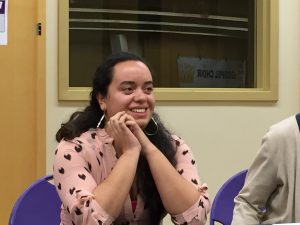New York ‘undocumented’ film, web star shares journey with Proviso students
By Jean Lotus Staff reporter — November 23, 2016
Immigrant web and film star Angy Rivera, of Queens, N.Y., visited Proviso Township high schools Nov. 17-18. (Chronicle Illinois Media).
“Being undocumented isn’t something we can put in the back of our heads. It’s the first thing I think of when I wake up.”
So begins the POV documentary “Don’t Tell Anyone (No Le Digas a Nadie)” that follows Angy Rivera, a Columbian immigrant and resident of Queens, N.Y., as she steps “out of the shadows” and publically announces she is undocumented to the Internet, and the world.
Rivera herself visited the Proviso Township District 209 high schools last week to speak to students. She also spoke after a screening of the film open to the public. Rivera offered support for the 40 percent Latino students in the district in a time when undocumented immigrants are fearful of campaign rhetoric promising to deport millions. “Luke” a Korean undocumented student also shared his story.
Filmmaker Mickaela Schwer begins at Angy’s high school graduation, the point at which paths diverge for those with citizenship papers and those without.
In a “mixed-status” household, with three younger siblings born in the US, Rivera draws on a common fear that she and her mother would be deported and the three younger children would be placed in foster care.
A hard-working student, being told by the college counselor, “Stop wasting my time if you don’t have a ‘Social [Security number],’” threw her into despair, she said.
It was 2010, when a new group of undocumented students were becoming public in cities across the country. They called themselves the DREAMers based on the DREAM Act (Development, Relief, and Education for Alien Minors), which passed the U.S. Senate in 2010, but never became law. DREAM was a path to national residency status for students brought into the country as minors, who graduated from high school and college/community college.
Undocumented immigrants are ineligible for federal financial aid and most state aid too. They are also charged “international student” tuition — the highest price — at most public American universities.
Rivera set up a crowd-funding website explaining she was not a citizen, but trying to attend college. A retired transportation worker with RTA paid a year’s tuition for her. She also started an online advice column “Ask Angy: The first and only undocumented youth advice column in the country.”
“I get lots of hate mail,” Rivera said.
While her mother panicked that Rivera would endanger herself and their family with the publicity, she became even more adamant, organizing “open mics” where undocumented young people could meet each other and talk about their fears and challenges. Traveling by airplane is considered extremely dangerous, for example.
“Sometimes I’m dreaming that I can crush my chains and my mother’s at the same time,” Rivera said in the film.
Eventually, Rivera decided to go public with another shameful secret: She had been sexually abused by her stepfather between the ages of 4 and 8. She and her brothers had been taken into foster care.
But the fact that she had been a victim of a crime and her mother had turned her stepfather over to police, actually proved to be a path to a legal status for both women. American U-Visas are available to victims of crime, her immigration lawyer told her.
In the film, when she receives the news that her U-Visa application has been accepted she describes herself as “hurt, angry and sad.”
“Why do you have to be abused or victims of a crime? Why do you have to be raped to get a visa? Why can’t you just get one for working hard and doing things right?”
Speaking at Proviso Math and Science Academy Nov. 17, Rivera said 65,000 undocumented students graduate from high school every year, but about 5-7 percent go on to college.
Tanya Cabrera, associate director for equity and inclusion at University of Illinois at Chicago runs an office called Undocumented Student Support. She said each student’s path could be different, but undocumented students shouldn’t rule out private or religious colleges, where scholarships don’t require citizenship. “It’s the student who drives the path,” Cabrera said.
Luke, an undocumented high school graduate from Korea said many Korean teens who came to the U.S. as young children without residency status don’t even know they can’t go to college until they graduate from high school.
“There’s a culture of shame and secrecy on top of everything else,” Luke said.
Finding ways to motivate students who know they can’t go to college is difficult, Rivera acknowledged. One teacher in the crowd said at another suburban school, Latino students in the AP program were dropping out and not finishing homework.
“How can they be motivated?” she asked.
Rivera said speaking publically in school about options for undocumented students made students feel like they were not alone and afraid. Letting students know that the school was a safe place for them was also a way to ease fears.
Cabrera also mentioned legislation in Springfield that may help immigrant students. The Student ACCESS bill (Access to College and Career-Education for Statewide Success) is waiting for passage in the Illinois House.
“Call and ask [legislators] to support Student ACCESS,” Cabrera said.
Read the current issue of the Cook County Chronicle
Free subscription to the digital edition of the Cook County Chronicle
— New York ‘undocumented’ film, web star shares journey with Proviso students —



